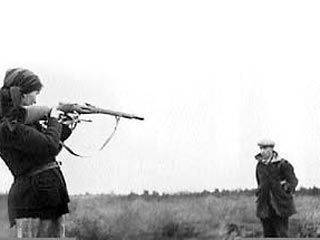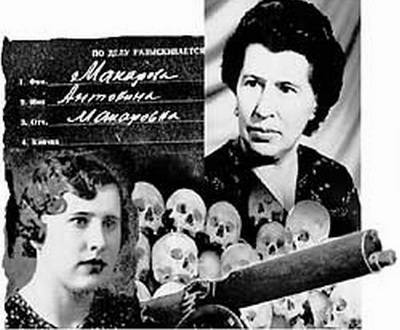Tonya-machine gunner
 She hoped to get three years probation, but the Soviet court sentenced her to capital punishment. 1979 year in the USSR was declared the Year of the Woman and she hoped for the favor of the court. But in the morning of August 11 1979, she was shot. In the USSR, it was the last major case involving traitors and executioners who collaborated with the German occupiers during the war and the last and only time that a woman was shot.
She hoped to get three years probation, but the Soviet court sentenced her to capital punishment. 1979 year in the USSR was declared the Year of the Woman and she hoped for the favor of the court. But in the morning of August 11 1979, she was shot. In the USSR, it was the last major case involving traitors and executioners who collaborated with the German occupiers during the war and the last and only time that a woman was shot.In Vyazemsky boiler
Even the investigators did not expect such a harsh sentence. No one argued that Antonina Makarovna-Ginzburg’s guilt in mass killings during the war was fully proven. But on the other hand, more than 30 years have passed since then, and a girl born in a simple working family, who turned 1941 in 19 years, could not be considered a convinced traitor and Nazi. Moreover, the circumstances in which she found herself simply did not give her a choice. But the court, meanwhile, reasonably reasoned that the crimes committed by Tonya did not have a statute of limitations, well, the circumstances ... the person always has a choice and the court considered that in the distant 1941 year Antonina Makarova made her choice. Tonya came to the front from Moscow, where, shortly before the war, she came from her native village Malaya Volkovka, Smolensk Region. In Moscow, the girl was going to study, and then get a job, but all plans were canceled by the war. Tonya took machine-gunners courses, then nursing courses and already in this status and went to the army to defend the capital. Where she got into the terrible meat grinder of the Vyazemsky boiler, in which about a million soldiers and officers of the Red Army perished, there, surrounded by a large number of corpses, the young orderly once and for all breaks down the psyche. This is followed by several endless months of leaving the encirclement, wandering through the Bryansk forests with random satellites, as well as she, heading east. In the end, Tonya was left completely alone and walked without sorting out the roads, begging in the Bryansk villages, until finally she got to the village of Lokot, where she fell into the hands of the policemen. They raped her, watered them with moonshine, fed them and raped them again, and one morning, completely drunk, were taken into the courtyard, seated at a machine gun and ordered to shoot at the exhausted people standing at the end of the yard whose hands were tied. And Tonya pulled the trigger ...
"I did the work ..."
An entry from the interrogation report of Antonina Makarova-Ginzburg of June 1978: “Everyone who was sentenced to death was the same for me, only their number changed. Usually I shot people in 27 groups in person, as many people were holding the camera of the police station. I shot people in 500 meters from the prison, not far from some pit, where they threw corpses. People were chained to the pit, one of the men dragged a machine gun, at the command of the authorities opened fire and fired until everyone fell. So I did my job for which I was paid. It was necessary to shoot not only male partisans, but also members of their families, children, and women. Later, I tried not to recall this. ” For such a “job” Tonya received German marks 30 a day, no one had any symbolism in this amount or not. At first everything for her was like in a fog, and before being shot she was watered with schnapps, but then she got used to it and drank after the execution. Since childhood, one of the heroines of Tony was Anka-machine gunner, and here you are, a real machine gun, lie down and shoot. To whom to shoot, Tone at the moment did not seem important. Upon completion of the “work”, she removed the clothes she liked from the corpses, washed them from the blood, and changed them to herself. Carefully and carefully handled the machine gun, cleaned it, in the evenings went to the dance and drinking with the policemen and occupiers. How many people she shot, Tonya did not count, but according to eyewitnesses, Antonina was the only executioner who carried out the death sentences in Lokoti. After the war, SMERSH representatives found in dug pits around 20 000 bodies.
 Second Life
Second LifeIn 1943, she was lucky, she picked up a sexually transmitted disease and was sent to Germany for treatment, thus, when the Red Army freed Lokot Toni-machine gunner there was no longer there. Having escaped from the German hospital, Antonina was able to fix her documents and disappear into the rear, she again got a job as a nurse in a military hospital, where she met her future husband, married him and took his last name.
She was looking for more 35 years. The facts about her existence were enough - many of the captured policemen told about Tonka the machine gunner, the case of the executioner girl passed from hand to hand, sent to the archive, and re-emerged. The KGB did not sit back, everything was carefully and secretly checked! Antonin Makarov is of similar age, but was not among those sought.
And Antonina Makarova was not at all hiding, except for a change of last name to her husband’s last name. They lived together in the quiet Belarusian town of Lepele, after the war Antonina gave birth to two daughters to her husband. Her portrait was hung on the board of honor, she went to performances in front of schoolchildren, was awarded commemorative medals and gifts. Their family was a strong and honored family of city veterans. “It’s impossible to be afraid all my life, for the first 10 years I was still waiting for a knock at the door, then I calmed down completely, there are no such sins in the world that would persecute a person all his life,” she later said during interrogation. Later it became clear why she had been so unpunished for so long. As a child, when enrolling in school, the teacher incorrectly recorded it in the metric, the patronymic she wrote down her last name. In 1976, one of the Moscow officials when traveling abroad honestly listed the names and surnames of all their relatives, there were five children in the family, all were Parfenovs, but for some reason Makarova was recorded, from 45 by the name of her husband Ginzburg. Thus, the special services went on the trail of the executioner girl.
"Honored frontline"
They did not immediately detain her, for a whole year the investigators checked all the facts in order to remove all doubts and God forbid, not to be mistaken, punishing a person respected in the city, a war veteran. Police officers and other witnesses were secretly brought to Lepel for identification, all of them admitted to a very old Tonka-machine-gunner woman. During the arrest, she did not lie and resist, at the first interrogation she calmly and clearly began to talk about what was happening in the German occupation, that for so long and hard she tried to forget. Of the many thousands of bodies found in Lokot burials, only 168 people were identified, it was Antonin Makarova who was officially blamed for their murder. In 1978, the Military Collegium of the Bryansk Regional Court issued a death sentence for the defendant, in August 1979 was carried out.
Information